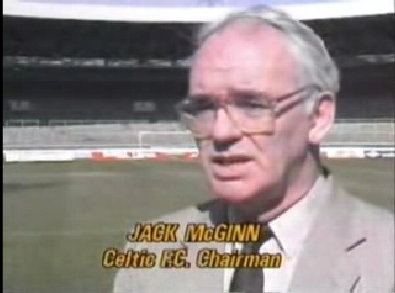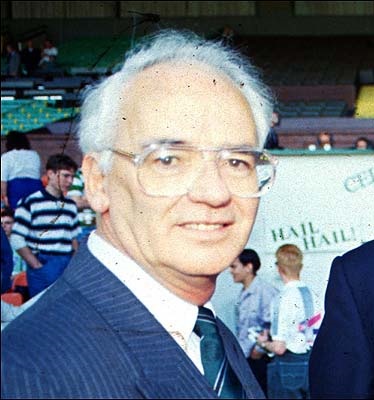Celtic Board – Past | Celtic Board | Celtic’s Foundation | About Celtic
Details
Name: John McGinn
aka: Jack McGinn
Born: [1933]
Died: 14 May 2025
John McGinn (“Jack McGinn”)
- After the atrocious refereeing of the League Cup (Skol Cup) Final in October 1986, the manager David Hay had asked for McGinn to resign from the Scottish League Management Committee as a protest. This proposal sank without trace and it is interesting to note the further rise of Jack McGinn through the halls of power at both the Scottish League and FA later in his career. An earlier protest resignation would no doubt have somewhat stunted that glorious rise.
- Started at Celtic in running the Celtic View club newspaper (then a first in British football).
- Commercial director appointee in 1981.
- His grandson Stephen McGinn is a player for St Mirren, and in 2007 scored against Celtic, but in Oct 2008 he scored the single goal to win a game against Rangers that put Celtic to the top of the table (if Rangers had drawn at least they’d have gone back up to the top). Another Grandson, John McGinn, made a big name for himself at Aston Villa. Another, Paul McGinn, was captain at Motherwell.
Biog
Jack McGinn was appointed to the club in 1965, being taken on to establish and run the Celtic View. With his background in publishing he saw a niche to get the club’s views across to the fans without going through the mainstream media. He was given a grant by the Board to set the newspaper up and this was easily paid back within the first season. McGinn was the View’s first Editor.
The venture was so successful that he was appointed Commercial Manager in 1981 and given a seat on the Board
Following the death of Desmond White in July 1985 he was appointed Vice Chairman and with the death of Tom Devlin in September 1986 he became the Chairman.
His reign was never an easy one, and it was in particular during his reign that the term “Biscuit Tin” was first coined by the fanzines to describe the board’s handling of finances at the club.
He was responsible for the re-appointment of Billy McNeill as Manager at the end of the 1986/87 season and the sacking of Davie Hay, and a prime mover of the plans to relocate the club and build a ‘super-stadium’ at Cambuslang but he resigned as Chairman of Celtic on 17th October 1991 prior to the launch of the plans. He still maintained contact with Celtic as a non-executive Director at the club.
He retained his position on the Board after Fergus McCann’s take-over of the club but on the 4th August 1994 he announced his intention to stand down (after being asked to stand aside by the new Board). He still maintained some kind of role and was said to be a ‘Legislative Advisor’ to the club.
In the meantime he had also been appointed as Treasurer of the SFA and he continued in that post. He went on to become SFA Vice-Chairman and President of the SFA in 1997. He resigned as President prior to his 70th birthday, in the summer of 2003 but he retained his positions as a Scotland representative of Uefa’s club competitions committee and Fifa’s World Club Championship committee.
It is difficult to assess Jack McGinn’s influence and period at Celtic as a fan. Without doubt an able manager and organiser, he presided over the Board at a time when the predominantly ‘family’ ownership of the club was being seriously questioned. Under his Chairmanship the club missed vital opportunities in a period when the influence, mass appeal and money in football was expanding rapidly.
It took the McCann ‘revolution’ to bring Celtic into the modern age.
Jack McGinn’s period in office spans this crucial period in the club’s history but is not regarded highly (in a business sense) from many of the fans from that time.
Post-Note:
Sadly, his judgement (alongside that of Kevin Kelly & other old Board members from the 1980s) was further tainted years later when revelations were revealed that he had entered business relations with Jim Torbett who later was found guilty of child abuse against young boys in the Celtic Boys Club. This does not mean that he was aware in whole or in part of any of the wrong doings. Jim Torbett had once been released from Celtic Boys Club but later returned a number of years later.
The question is what did he know or not on the events surrounding Jim Torbett? Was he able to help those affected, or did the poor management at Celtic provide the environment to allow Jim Torbett to proceed with his actions? One statement in court (by Hugh Birtt) claimed that he had tried to inform board member Kevin Kelly (and other board members) of concerns over Jim Torbett and that Kevin Kelly will have (allegedly) known about the concerns on Jim Torbett. Kevin Kelly and Jack McGinn strongly denied being aware of allegations concerning Torbett when he returned to the Boys Club, and told the BBC that he was not aware of any previous allegations against Torbett until his court case in the 1990s.
In fairness, Jim Torbett and his ilk have a knack to pull the wool over the eyes of everyone and that is what happened at Celtic, as the victims were too young to come forward (it takes a lot of bravery & understanding) and it was a different time. These cases have occurred across a number of football clubs in the UK (including Hibs & Rangers).
It may not be fair to taint Kevin Kelly and Jack McGinn with what occurred, but on top of all the mishandling whilst at Celtic, this in addition to all else sadly doesn’t help their case. Both Jack McGinn and Kevin Kelly are good decent men from all the reports we have on them from people, and from the information we have to date, we do not believe either would have been party to anything that occurred but answers had to be given where possible for the benefit of the victims and their families. Celtic settled with the families in 2025.
He passed away in May 2025.
Quotes
McCann recalls:
“The stadium had to be rebuilt and people were saying why don’t you just buy the players Fergus? We’ll stand in the mud.
“But the stadium was a tool. We had to have a season-ticket base.
“Jack McGinn was saying, “We don’t want season-ticket holders, they are nothing but trouble.”
“Well, I just couldn’t live with that marketing philosophy at all.
“The answer is that you have got to fill the park.
“The average crowd was 28,000 and we built a 60,000-seat stadium.
“How smart was that? Well, it was the right thing to do.”
Fergus McCann highlights McGinn’s comment, and possibly illustrates the old board members’ mentality and why they weren’t good enough to manage the club then or after the takeover.
Condolences after the passing of former Celtic chairman, Jack McGinn
https://www.celticfc.com/news/2025/may/14/condolences-after-the-passing-of-former-celtic-chairman–jack-mcginn/
Club News
By Celtic Football Club
Share
14 May 2025, 4:41 pm
Everyone at Celtic Football Club is extremely saddened at the death of former Celtic chairman, Jack McGinn, who has passed away at the age of 92.
Jack first joined Celtic back in 1965, having previously been a newspaper executive, in order to help the club establish its own newspaper, an idea he had brought to the board.
That was the Celtic View, which was first published on August 11, 1965, and it remains the oldest club publication in football some 40 years later.
Jack was the first editor of the Celtic View, a position he would hold for a number of years, and he always remained a strong supporter and avid reader of the publication.
Appointed the club’s Commercial Manager in 1981, he was given a seat on the board, becoming vice-chairman in 1985 and Celtic chairman a year later.
Jack would remain as chairman for five years, and his tenure included the unforgettable Centenary season, when Celtic, then managed by Billy McNeill who had returned to the club at the start of the campaign, won a league and cup double.
He remained as a non-executive director after stepping down as chairman, eventually standing down in August 1994.
Jack also occupied a number of roles within the SFA, which culminated in him becoming SFA chairman in 1997, a position he held for almost six years.
He always remained a dedicated Celtic supporter and he was a regular presence at Celtic Park over the past few years.
Celtic chairman, Peter Lawwell, said: “I would like to offer my sincere condolences to Jack’s family following his sad passing.
“I first met Jack 35 years ago, and he was a fine, humble, unassuming man, a true Celtic man who always did his very best for the club he loved.
“He gave his full energy and commitment to Celtic across a number of roles, often in difficult times for the club but always working in the best interests of Celtic.
“I know he will be sadly missed by his family, friends and so many people at the club. We send our heartfelt thoughts and prayers.”
The Celtic players will wear black armbands at tonight’s Premiership game against Aberdeen at Pittodrie as a mark of respect.
The thoughts and prayers of everyone at Celtic Football Club are with Jack’s family at this extremely sad time

